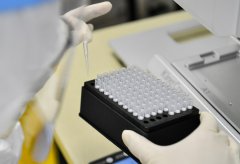Tweaked COVID vaccines in testing aim to fend off variants
New versions of COVID-19 vaccines are now being tested in case they ever are needed to protect against mutated versions of the virus
April 12, 2021, 4:17 PM
5 min read
Cole Smith receives a Moderna variant vaccine shot from clinical research nurse Tigisty Girmay at Emory University's Hope Clinic, on Wednesday afternoon, March 31, 2021, in Decatur, Ga. Smith, who received Moderna's original vaccine a year ago in a first-stage study, said returning wasn’t a tough decision. “The earlier one, it was a great success and, you know, millions of people are getting vaccinated now. ... If we’re helping people with the old one, why not volunteer and help people with the new one?” (AP Photo/Ben Gray)
Dozens of Americans are rolling up their sleeves for a third dose of COVID-19 vaccine -- this time, shots tweaked to guard against a worrisome mutated version of the virus.
Make no mistake: The vaccines currently being rolled out across the U.S. offer strong protection. But new studies of experimental updates to the Moderna and Pfizer vaccines mark a critical first step toward an alternative if the virus eventually outsmarts today’s shots.
“We need to be ahead of the virus,” said Dr. Nadine Rouphael of Emory University, who is helping to lead a study of Moderna's tweaked candidate. “We know what it's like when we're behind.”
It's not clear if or when protection would wane enough to require an update but, "realistically we want to turn COVID into a sniffle,” she added.
Viruses constantly evolve, and the world is in a race to vaccinate millions and tamp down the coronavirus before even more mutants emerge. More than 119 million Americans have had at least one vaccine dose, and 22% of the population is fully vaccinated, according to the Centers for Disease Control and Prevention. Much of the rest of the world is far behind that pace.
Already an easier-to-spread version found in Britain just months ago has become the most common variant now circulating in the United States, one that’s fortunately vaccine-preventable.
But globally, there's concern that first-generation vaccines may offer less protection against a different variant that first emerged in South Africa. All the major vaccine makers are tweaking their recipes in case an update against that so-called B.1.351 virus is needed. Now experimental doses from Moderna and Pfizer are being put to the test.
In suburban Atlanta, Emory asked people who received Moderna's original vaccine a year ago in a first-stage study to also help test the updated shot. Volunteer Cole Smith said returning wasn’t a tough decision.
“The earlier one, it was a great success and, you know, millions of people are getting vaccinated now,” Smith told The Associated Press. “If we’re helping people with the old one, why not volunteer and help people with the new one?”
The study, funded by the National Institutes of Health, isn’t just testing Moderna’s experimental variant vaccine as a third-shot immune booster. Researchers at Emory and three other medical centers also are enrolling volunteers who haven’t yet received any kind of COVID-19 vaccination.
They want to know: Could people be vaccinated just with two doses of the variant vaccine and not the original? Or one dose of each kind? Or even get the original and the variant dose combined into the same injection?
Separately, the Food and Drug Administration has given Pfizer and its German partner BioNTech permission to start similar testing of their own tweaked vaccine. The companies called it part of a proactive strategy to enable rapid deployment of updated vaccines if they’re ever needed.
The Moderna and Pfizer vaccines, like the majority of COVID-19 vaccines being used around the world, train the body to recognize the spike protein that is the outer coating of the coronavirus. Those spikes are how the virus latches onto human cells.
Mutations occur whenever any virus makes copies of itself. Usually those mistakes make no difference. But if a lot of changes pile up in the spike protein -- or those changes are in especially key locations -- the mutant might escape an immune system primed to watch for an intruder that looks a bit different.








